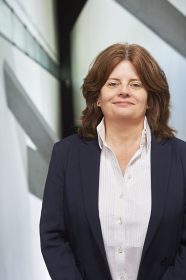New program director of the Jewish Museum Berlin holds lecture for future museum generation
1) Dear Mrs. Meijer-van Mensch: over the last years you have worked for various institutions in different countries. What distinguishes the museum landscape in Germany from other countries in your opinion?

Program director Léontine Meijer-van Mensch puts much value upon the promotion of the future museum generation; Jewish Museum Berlin, photo: Yves Sucksdorff
First I would like to say that in Germany – contrary to the Netherlands – there is a widely supported notion that culture in general (and therefore museums) is important. It is stimulating to be able to work in such an environment. Before World War II German museology was very influential worldwide. After the war Germany lost its leading position and new developments in the international museum world were not always fully embraced. An example is the importance of education and the role of educators within the organization of the museum. As compared to many of the other countries I know the German museum landscape is not very flexible and open. It is difficult to enter the system and people tend to stay long in their positions. This is not a favorable condition for out-of-the-box thinking. On the other hand we should not underestimate the importance of accumulated institutional knowledge and memory.
2) In the course of the 27th Federal Museum Trainees Conference you will hold a lecture tomorrow on the topic of “Does less mean more? Collecting with Bravery – Between Proactive Collecting and Conglomeration”. Which aspects will be discussed in more detail? What shall museums and other cultural institutions pay more attention to?
I will be speaking about collection development, i.e. the efforts to optimize the use-value of collections. This does not always mean continuous growth. Selective reduction of the collection (deaccessioning) can also be an instrument. One of the most important issues is how to address the growing diversity of our modern society, not only in our exhibitions, but especially in our collections. I think cultural entrepreneurship will become more and more important for museums. People who work in museums should not be afraid to adopt contemporary management thinking and practices.
3) Last but not least: what would you like to give young trainees along their way?
Key assets are creativity and open-mindedness. Future museum generations should be willing to look beyond the borders of their disciplines and beyond the borders of the German museum landscape. The future of museums’ work will be increasingly interdisciplinary and international. My personal message to the participants of the conference is: treasure the networks that you are creating now. They will be of enormous support throughout your professional career.
The 27th Federal Museum Trainees Conference will take place from Friday to Sunday (3–5 March) at Deutsches Technikmuseum, Jewish Museum Berlin and Berlinische Galerie.
More information on the event on Facebook (in German): https://www.facebook.com/Bundesvolontaerstagung/?fref=ts
The interview was conducted by David Studniberg who is part of the organizational team of the conference.